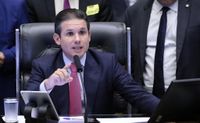On Monday, April 28, 2025, Hugo Motta, President of the Chamber of Deputies, announced that the proposal to expand the Income Tax exemption for individuals earning up to R$ 5,000 monthly is unlikely to be voted on until the second semester of the year. This statement was made during the J. Safra Macro Day event held in São Paulo, where discussions centered on Brazil's macroeconomic and geopolitical landscape.
Motta explained that the complexity of the proposal and its potential fiscal impact render an earlier vote unfeasible, particularly before the parliamentary recess scheduled for July 2025. “I think it might be left for the Chamber to vote after the recess, already in the second semester. I do not believe the Chamber will vote on this before the second semester because it is a measure that has a very significant impact, depending on how it will be constructed, for our economy,” he stated.
The special commission tasked with analyzing Bill 1087/25, which addresses the Income Tax exemption, is expected to be installed next week, starting April 29, 2025. Motta indicated that the discussions within this commission are anticipated to last about two months, adhering to the necessary procedural timelines before the text is forwarded to the Plenary.
Arthur Lira (PP-AL), the rapporteur for the bill, will lead the discussions. Motta emphasized that the project will undergo modifications to mitigate any adverse effects on the Brazilian economy. “The challenge is to try to find the least harmful way for this measure to be established, but from the standpoint of tax justice, we have a well-settled issue,” he remarked.
During his address, Motta also highlighted the importance of maintaining fiscal responsibility throughout the legislative process. He reiterated that the Congress aims to adopt proposals that enhance Brazil's attractiveness for investments, focusing on economic growth and job creation. “We will seek the most balanced and serene guidance possible for our country,” he assured.
Moreover, Motta pointed out the necessity for the Executive branch to lead a review of public spending, noting that the current fiscal waivers exceed R$ 650 billion, which places a significant burden on public finances. “We have over R$ 650 billion in waivers, and this is heavy for our machinery,” he observed. He also suggested that the efficiency of the public machine could be improved through infraconstitutional projects, avoiding the need for extensive administrative reforms.
When discussing the timeline for the bill's potential voting, Motta explained that if the 'noventena' principle is chosen, which allows for a 90-day period before new tax regulations take effect, the voting could occur by the end of September 2025. Alternatively, if the 'anualidade' principle is adopted, the deadline would extend to December 2025.
In light of the upcoming elections in 2026, Motta expressed optimism that 2025 is an ideal year for approving structural measures that could create a more favorable environment prior to the elections. “This first semester, in my view, is a period that I think could transition measures in this direction. I even think these measures would create a positive environment regarding the electoral issue,” he concluded.
As the discussions unfold, the focus remains on balancing the needs of the population with the economic realities facing Brazil. The proposed changes to the Income Tax exemption are seen as a significant step towards addressing the financial burdens on lower-income earners, while also ensuring that the overall fiscal health of the country is not compromised.
With the special commission set to convene soon, all eyes will be on how the discussions evolve and what adjustments will be made to the proposal to ensure its viability and acceptance among lawmakers. The road ahead may be challenging, but the commitment to fiscal responsibility and economic growth remains a priority for the Chamber of Deputies.





